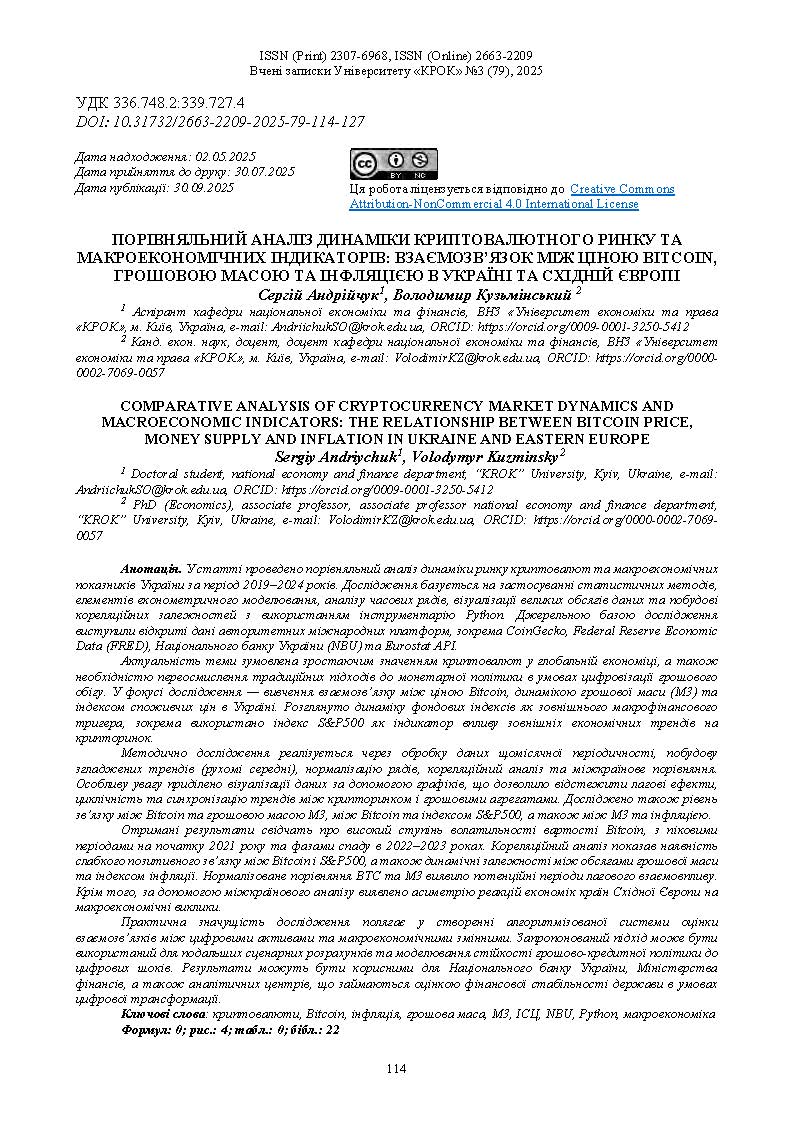ПОРІВНЯЛЬНИЙ АНАЛІЗ ДИНАМІКИ КРИПТОВАЛЮТНОГО РИНКУ ТА МАКРОЕКОНОМІЧНИХ ІНДИКАТОРІВ: ВЗАЄМОЗВ’ЯЗОК МІЖ ЦІНОЮ BITCOIN, ГРОШОВОЮ МАСОЮ ТА ІНФЛЯЦІЄЮ В УКРАЇНІ ТА СХІДНІЙ ЄВРОПІ
DOI:
https://doi.org/10.31732/2663-2209-2025-79-114-127Анотація
У статті проведено порівняльний аналіз динаміки ринку криптовалют та макроекономічних показників України за період 2019–2024 років. Дослідження базується на застосуванні статистичних методів, елементів економетричного моделювання, аналізу часових рядів, візуалізації великих обсягів даних та побудові кореляційних залежностей з використанням інструментарію Python. Джерельною базою дослідження виступили відкриті дані авторитетних міжнародних платформ, зокрема CoinGecko, Federal Reserve Economic Data (FRED), Національного банку України (NBU) та Eurostat API.
Актуальність теми зумовлена зростаючим значенням криптовалют у глобальній економіці, а також необхідністю переосмислення традиційних підходів до монетарної політики в умовах цифровізації грошового обігу. У фокусі дослідження — вивчення взаємозв’язку між ціною Bitcoin, динамікою грошової маси (М3) та індексом споживчих цін в Україні. Розглянуто динаміку фондових індексів як зовнішнього макрофінансового тригера, зокрема використано індекс S&P500 як індикатор впливу зовнішніх економічних трендів на крипторинок.
Методично дослідження реалізується через обробку даних щомісячної періодичності, побудову згладжених трендів (рухомі середні), нормалізацію рядів, кореляційний аналіз та міжкраїнове порівняння. Особливу увагу приділено візуалізації даних за допомогою графіків, що дозволило відстежити лагові ефекти, циклічність та синхронізацію трендів між крипторинком і грошовими агрегатами. Досліджено також рівень зв’язку між Bitcoin та грошовою масою М3, між Bitcoin та індексом S&P500, а також між М3 та інфляцією.
Отримані результати свідчать про високий ступінь волатильності вартості Bitcoin, з піковими періодами на початку 2021 року та фазами спаду в 2022–2023 роках. Кореляційний аналіз показав наявність слабкого позитивного зв’язку між Bitcoin і S&P500, а також динамічні залежності між обсягами грошової маси та індексом інфляції. Нормалізоване порівняння BTC та М3 виявило потенційні періоди лагового взаємовпливу. Крім того, за допомогою міжкраїнового аналізу виявлено асиметрію реакцій економік країн Східної Європи на макроекономічні виклики.
Практична значущість дослідження полягає у створенні алгоритмізованої системи оцінки взаємозв’язків між цифровими активами та макроекономічними змінними. Запропонований підхід може бути використаний для подальших сценарних розрахунків та моделювання стійкості грошово-кредитної політики до цифрових шоків. Результати можуть бути корисними для Національного банку України, Міністерства фінансів, а також аналітичних центрів, що займаються оцінкою фінансової стабільності держави в умовах цифрової трансформації.
Завантаження
Посилання
Авдєєв, О., & Каук, В. (2023). Дослідження методів прогнозування динаміки курсу криптовалют. Grail of Science, (26), 230–236. https://doi.org/10.36074/grail-of-science.14.04.2023.040
Бак, Н., & Муха, Р. (2022). Перспективи впровадження криптовалюти у ресторанний бізнес в Україні. Grundlagen der modernen wissenschaftlichen Forschung, European Scientific Platform. https://doi.org/10.36074/logos-12.08.2022.09
Белінська, Я. В., & Дікарев, О. І. (2020). Криптовалюти: сутність, виникнення та закономірності поширення і ціноутворення. Економічний вісник. Серія: фінанси, облік, оподаткування, (5), 22–32. https://doi.org/10.33244/2617-5932.5.2020.22-32
Бойко, В. П. (2021). Сучасний тренд на впровадження цифрової валюти центральних банків. In Economy digitalization in a pandemic conditions: processes, strategies, technologies (pp. XX–XX). Publishing House “Baltija Publishing”. https://doi.org/10.30525/978-9934-26-028-5-3
Бондаренко, Л. П., & Лащик, І. І. (2023). Криптовалюти: тенденції, виклики та перспективи. Ефективна економіка, (2). https://doi.org/10.32702/2307-2105.2023.2.45
Голюк, В., Кузьмінський, В., & Чумаченко, О. (2024). Сучасний стан фондового ринку України та перспективи його розвитку. Економіка та суспільство, (64). https://doi.org/10.32782/2524-0072/2024-64-96
Пилипченко, О., Кузьмінський, В., & Чумаченко, О. (2021). Використання методів технічного аналізу для прогнозування ринку криптовалют. Вчені записки Університету «КРОК», (4(64), 28–35. https://doi.org/10.31732/2663-2209-2021-64-28-35
Binance. (2025). Binance Markets Overview. https://www.binance.com/uk-UA/markets/overview
Bouri, E., Lau, C. K. M., Lucey, B., & Roubaud, D. (2019). Trading volume and the predictability of return and volatility in the cryptocurrency market. Finance Research Letters, 29, 340–346. https://doi.org/10.1016/j.frl.2018.08.015
García-Monleón, F., Erdmann, A., & Arilla, R. (2023). A value-based approach to the adoption of cryptocurrencies. Journal of Innovation & Knowledge, 8(2), 100342. https://doi.org/10.1016/j.jik.2023.100342
Nguyen, D. T. A., & Chan, K. C. (2024). Cryptocurrency trading: A systematic mapping study. International Journal of Information Management Data Insights, 4(2), 100240. https://doi.org/10.1016/j.jjimei.2024.100240
Samuele, B. (2023). Money in the Time of Crypto. Research in International Business and Finance, 101964. https://doi.org/10.1016/j.ribaf.2023.101964
Urquhart, A., & Yarovaya, L. (2023). Cryptocurrency research: future directions. The European Journal of Finance, 1-6. https://doi.org/10.1080/1351847x.2023.2284186
Vasudeva, S. (2023). Cryptocurrency as an investment or speculation: a bibliometric review study. Business Analyst Journal. https://doi.org/10.1108/baj-07-2022-0008
Federal Reserve Bank of St. Louis. (n.d.). FRED Economic Data. Retrieved April 2025, from https://fred.stlouisfed.org/
National Bank of Ukraine. (n.d.). NBU Open Data API. Retrieved April 2025, from https://bank.gov.ua/en/open-data/api-dev
CoinGecko. (n.d.). CoinGecko API Documentation. Retrieved April 2025, from https://www.coingecko.com/en/api
Eurostat. (n.d.). Eurostat Dissemination API. Retrieved April 2025, from https://ec.europa.eu/eurostat/web/json-and-unicode-web-services
CoinMarketCap. (n.d.). CoinMarketCap API Documentation. Retrieved April 2025, from https://coinmarketcap.com/api/
Open Exchange Rates. (n.d.). Currency Exchange API. Retrieved April 2025, from https://openexchangerates.org/
World Bank. (n.d.). World Bank Open Data API. Retrieved April 2025, from https://datahelpdesk.worldbank.org/knowledgebase/articles/889392-about-the-indicators-api-documentation
Trading Economics. (n.d.). TradingEconomics API Documentation. Retrieved April 2025, from https://tradingeconomics.com/api/

Downloads
Опубліковано
Як цитувати
Номер
Розділ
Ліцензія

Ця робота ліцензується відповідно до Creative Commons Attribution-NonCommercial 4.0 International License.

